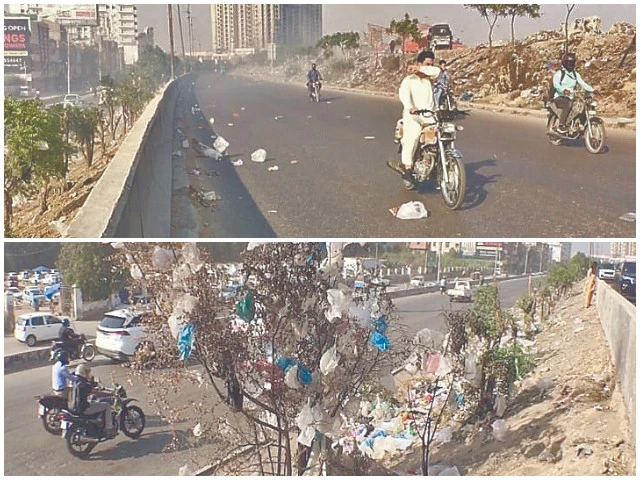Karachi's Korangi Expressway turns into toxic wasteland
Burning trash, flying plastics, air pollution threaten health and livelihoods

The Korangi Expressway, once a bustling thoroughfare, has now become an open landfill, plagued by the rampant burning of garbage and the illegal establishment of waste collection points. The relentless stench, clouds of toxic smoke, and plastic debris swirling through the air have turned life into a daily ordeal for residents of the areas around it — and even the motorists and motorcyclists.
The persistent air pollution has begun to take a heavy toll on the health of locals. Respiratory issues, especially asthma, and flu-like symptoms are widespread, while the once vibrant greenery along the Expressway is being smothered by the ever-growing accumulation of waste.
Waste collection points along the Expressway, often situated at multiple spots, have become epicenters for burning refuse. Trucks deliver garbage from across the metropolis, which is then set on fire to reduce its volume before being transported to landfill sites.
This practice not only contributes to the thick, noxious smoke enveloping the areas around the Expressway but also poses a safety risk for commuters. On some occasions, visibility has dropped to zero due to the smoke, creating hazardous conditions on the road. Meanwhile, plastic bags, carried by the wind, have become a common sight, clinging to trees, vehicles, and roads.
The situation has become increasingly unbearable for residents. Breathing has become difficult, especially for vulnerable groups such as children, the elderly, and asthma patients. The stench from the burning garbage has made daily life a struggle.
Students of the Iqra University, which is located near the affected area, have reported that the smoke and foul odor have disrupted their ability to focus, even inside classrooms. "There are no leaves left on the trees-only plastic. It feels as though the whole area is adorned with trash. This isn't a natural change, but rather a failure of the administration," one student Ali Aamir said while talking to The Express Tribune.
Another student said, "We used to enjoy tea at the open-air café, but now, even with masks on, the smoke makes it impossible to sit outside. Our eyes burn from the fumes."
The situation is equally troublesome for motorcyclists, who are often caught in the crossfire of flying plastic bags. These bags can stick to riders' faces, hands, or get entangled in tyres, increasing the risk of accidents. "This is a major artery of the city, yet it is being neglected by the authorities," one citizen complained.
Environmental expert Dr Amir Alamgir from the University of Karachi warned that Karachi's air pollution levels exceed global standards, worsened by traffic, industrial emissions, and garbage burning. "Plastic makes up over 60% of Karachi's solid waste. It blocks drains, pollutes the sea, and suffocates trees," he said. He urged public awareness and environmental education to combat the crisis.
Medical professionals echoed concerns, linking the smoke to rising cases of asthma and lung diseases. They advised residents to wear masks, shut windows, and protect vulnerable groups.
Sindh Solid Waste Management Board Managing Director Tariq Ali Nizamani acknowledged the issue and said complaints had been received. "Strong winds worsened the spread, but we're working on solutions," he said. The board has proposed 24-hour operation of Garbage Transfer Stations (GTS) and detained individuals burning waste for metal extraction. Four guards have been deployed to prevent further incidents.
With World Bank support, four enclosed GTS stations are under construction to curb odor and pollution. "Once operational, waste collection will follow scientific methods, offering relief to citizens," Nizamani assured.
Residents and students have urged authorities to relocate garbage points away from homes and schools and take strict action against illegal waste burning.



1724319076-0/Untitled-design-(5)1724319076-0-208x130.webp)















COMMENTS
Comments are moderated and generally will be posted if they are on-topic and not abusive.
For more information, please see our Comments FAQ